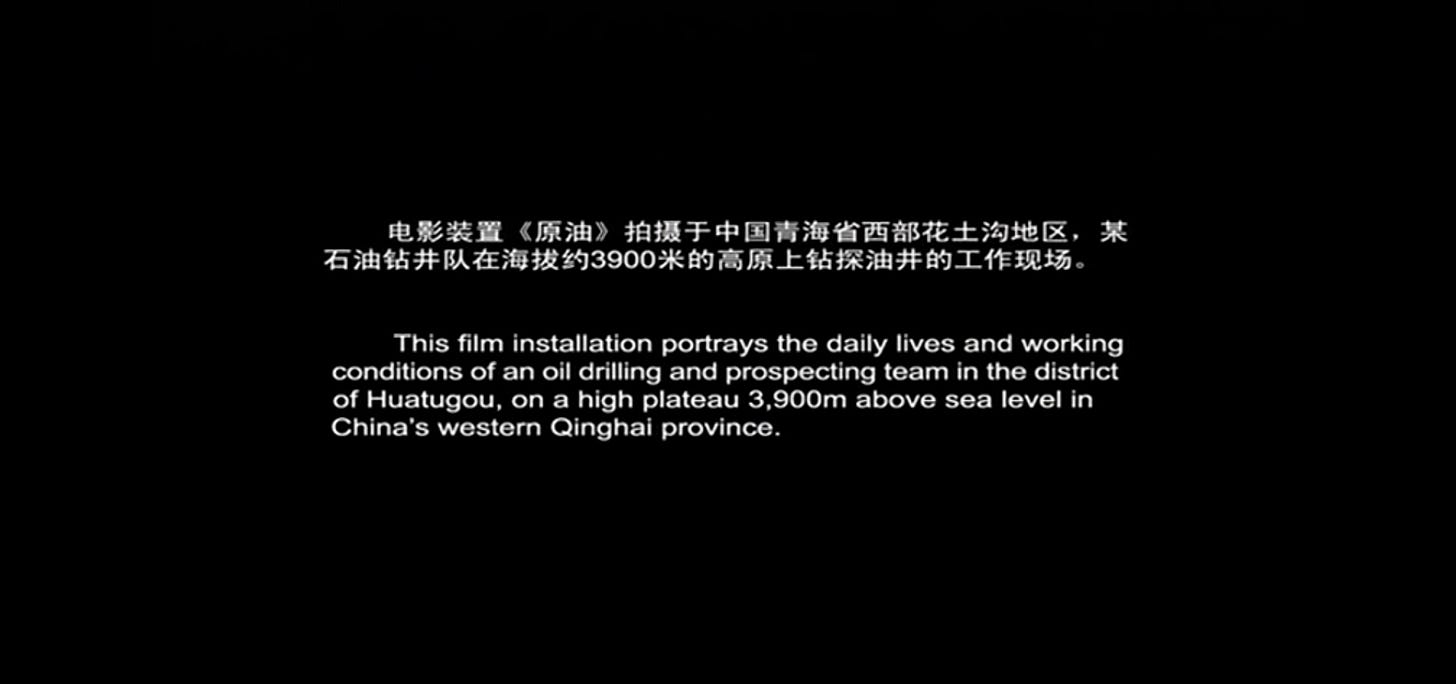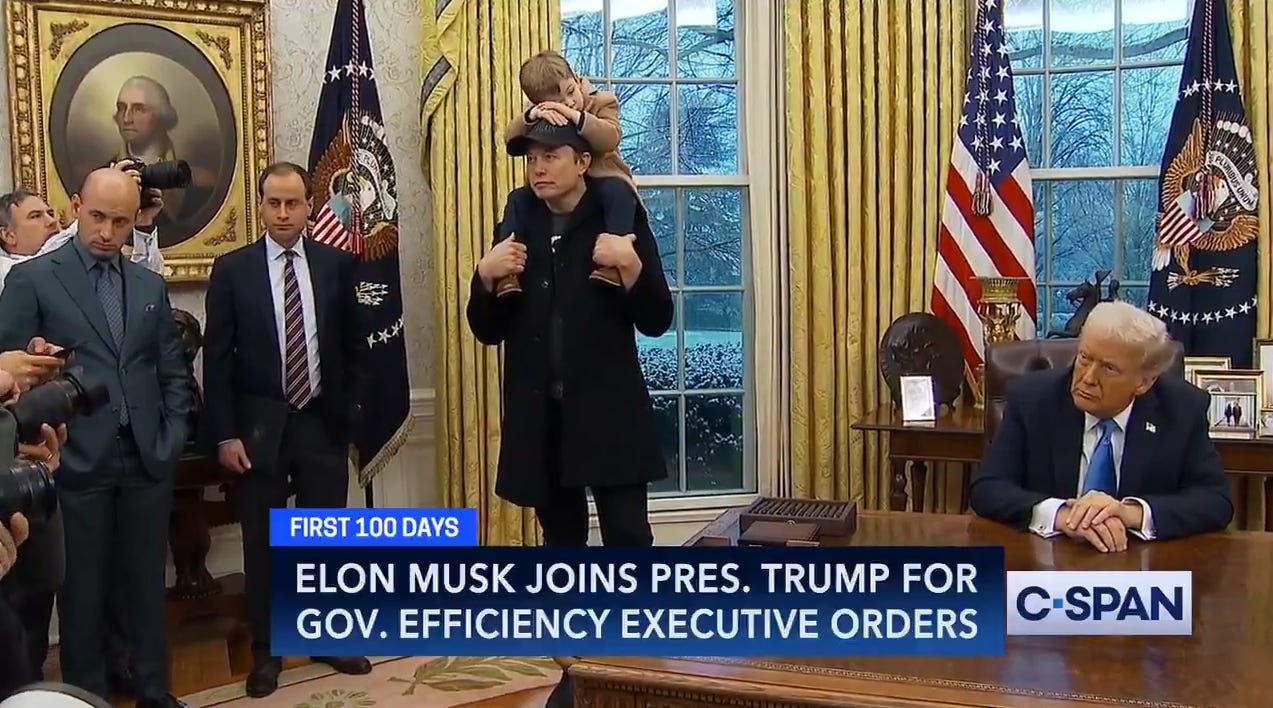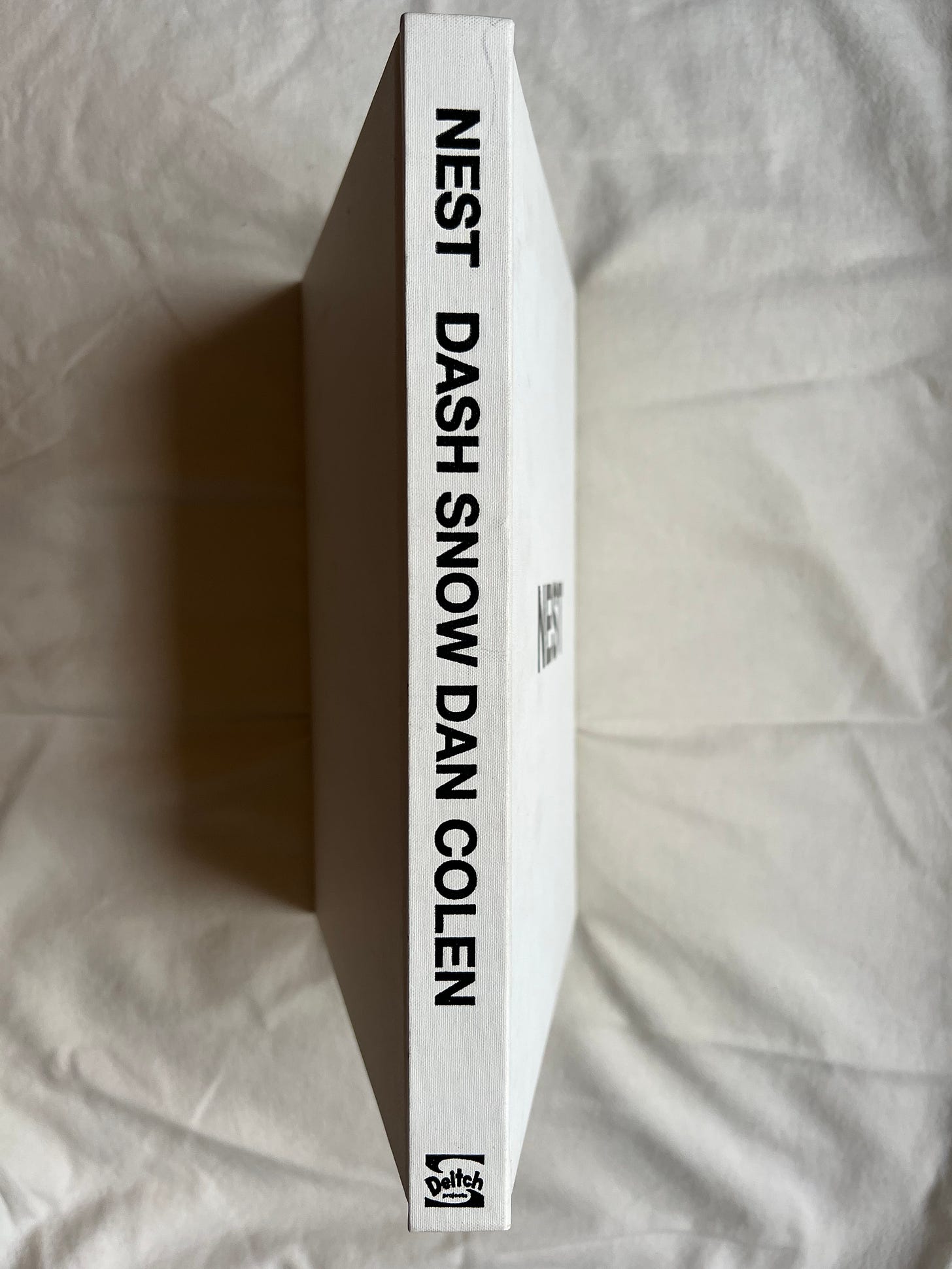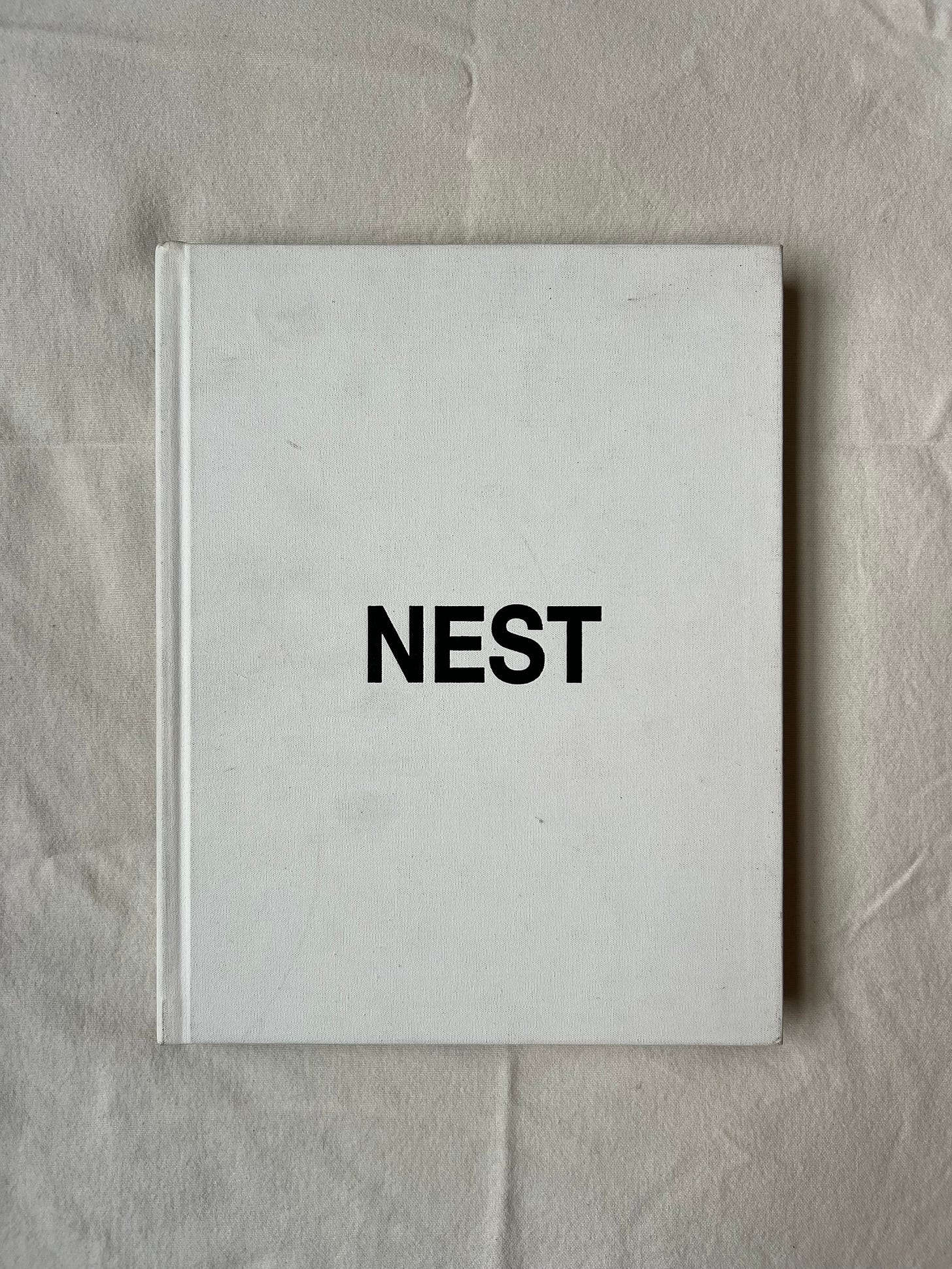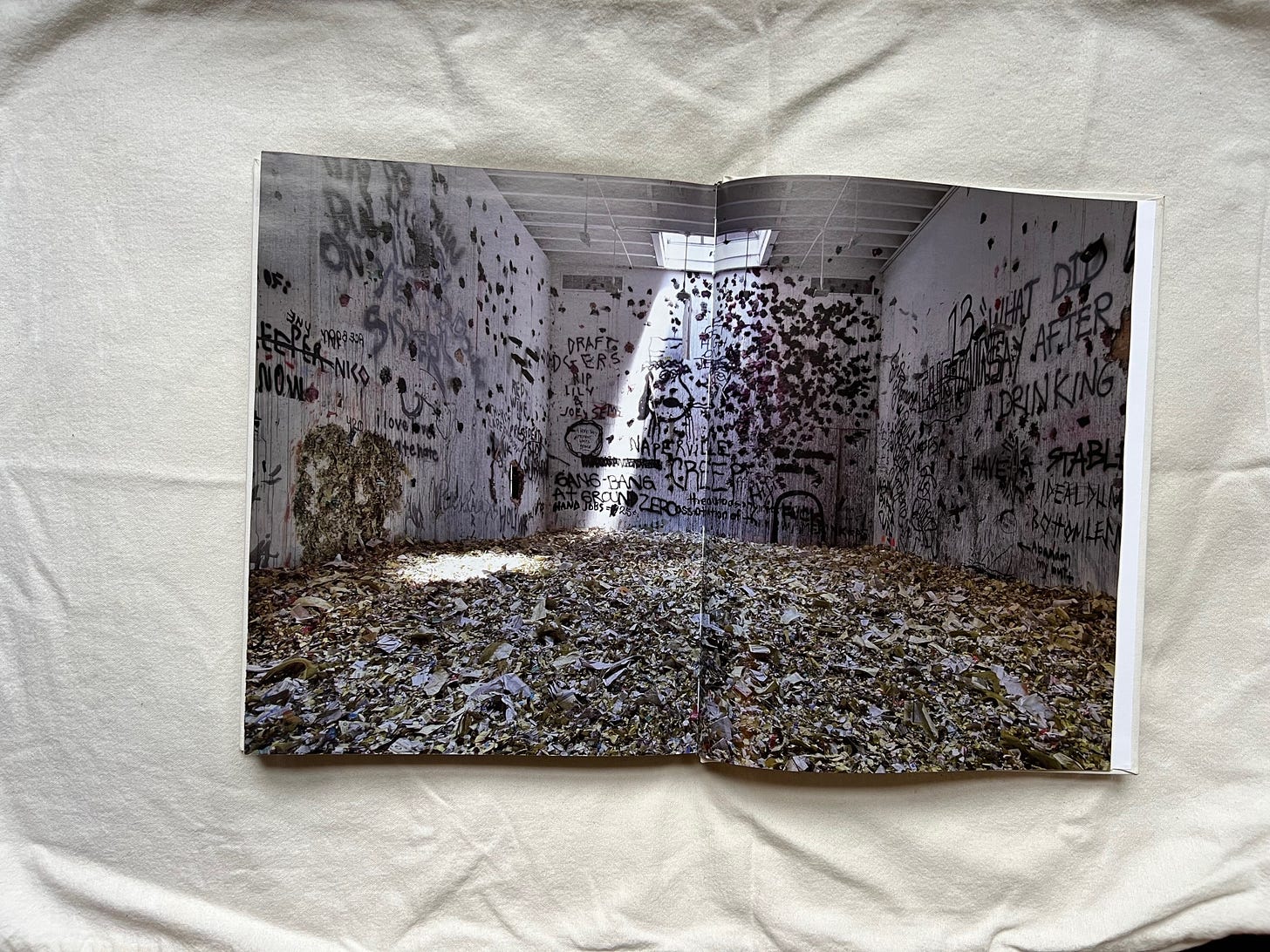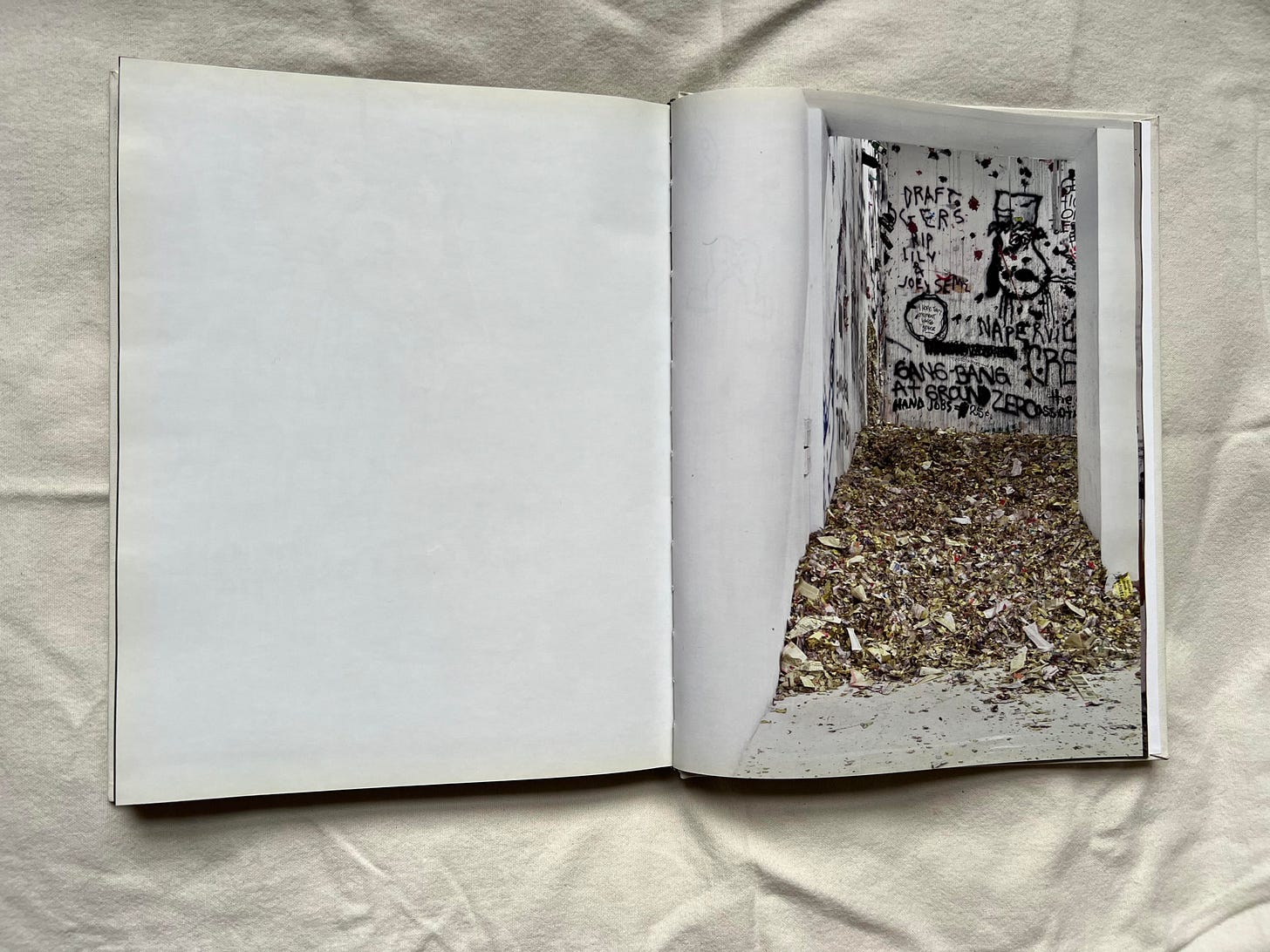11-12.2.25: Demographics, Crude Oil, ‘Beyond The Death Drive’
I found a phrase I thought I made up last night in Ronell’s Finitude’s Score, ‘beyond the death drive’, which she uses to describe the Bush-Quayle entity in terms of a kind of ‘presidential death drive’.
She was basically already giving a strong version of ‘we can’t blame the person of the president, it’s about what passes through them’. She was the first to write A Portrait of Donald Trump.
But seeing the phrase there I remembered demographics impossibilizes invention by now. There is just too much language on the planet for that phrase not to have already occurred—and at the same time language always already contains what it invents, and this itself is what is ‘beyond the death drive’.
Also watched the start of Wang Bing’s 15hr Crude Oil. It begins like this:
That first frame—of the slouched, exhausted figure—lasts several minutes, and one really does think/intuit what ‘crude oil’ means for the planet simply by attending its hold.
It occurs to me that the Bush-Quayle entity as Ronell describes it way back when is a very useful analogue for, let’s say, the Trump-Musk entity (as opposed to the Trump-Vance entity, which is no longer central).
We updated to a presidential extinction drive egregore.
Definite ventriloquist’s dummy vibes going on but both are ventriloquists/dummies. It’s not dumb and dumber tho more like dummy and dummy. Remember Trippie Redd’s ‘Dark Knight Dummo’ from the start of Trump’s first term?
Don’t u notice how in language now nobody is anything?
Like everyone has become an online observer who in principle has no affiliation.
Like in basic terms suddenly nobody was ever really a lib they were all just on ‘our side’ owning the libs all along.
Everyone is dialectically above.
Looking today at the pictures of Musk with Lil X in the Oval Office I think again of what Ronell says, that [the Trump-Musk entity] ‘may well extend beyond the death drive, which is to say, at the limit of the domain of drives [Triebe]’.
She goes on:
Going this way or that, they have mutated into a function of thingification where they are placed under instinctual arrest. I in no way intend simply to condemn one man or one man’s symptomatology.
But then I go back to what she says before that, before this becoming-thing which she connects to Quayle’s Freudian slip about the holocaust being ‘an obscene period in our nation’s history’, thereby making the holocaust, quite rightly, something that happened on America’s watch:
The name of the symptom: Dan Quayle. As dummy par excellence, he ventriloquizes with exceptional precision the breaches in presidential linguistics. He exists, as Bush’s political double or other, as that which cannot be; he scans as a sign for the impossibility of becoming president. As ventriloquizing locus and externalization of the president’s inarticulable phantasmata, Dan Quayle dramatizes the executive desire for historical effacement. He is moreover the figure that George Bush has chosen to replace and repeat himself, to fill his space and articulate its contours.
As I say, Musk is no dummy but he is certainly some kind of dummy par excellence.
But what Quayle said in 1988 more specifically was this,
The holocaust was an obscene period in our nation’s history. I mean in this century’s history. But we all lived in this century. I didn’t live in this century.
This ‘I’, that isn’t in this century, the century we all lived in—everyone except me—is the ‘I’ I was talking about above, the ‘I’ that observes everything online but isn’t part of it. The online observer is the one who didn’t live in this century.
And this seems to be what Ronell means by ‘thingification’.
The ‘vice-presidential unconscious’, she says, ‘knows how to read’, and what it seems to be reading is what is ‘beyond the death drive’, this online observer ‘I’ that runs away with itself everytime it says something, always thinking it has something to say and has to say something:
This subject, as pure subject of enunciation and inscription, is a dead subject who makes claims for not having lived in this century, or rather, for not having lived according to calendrial or historical time. Everyone lived in this century (‘we all lived’) but the speaker himself did not experience this century, which in his transmission metonymically displaces ‘the holocaust’. The (vice-)presidential unconscious knows that it does not know the holocaust, but this unknowing is obtained only as a condition of not having lived in this nation/century.
Rickels in The Case of California, read just now:
He [Kafka] gagged on something which (like diaries) has nothing to do with culture, but which, like California, is the surplus of everything.
DIARY 13.2.25: DMS, NEST, LIFETIMES
(But really these ‘diaries’ are in part dms sent to Mifynse Snow, in transplanting them here I am not sure what that does—I am certainly remembering you, right now on this earth I have certainly not forgotten you.)
For Valentine 2025 the book Nest finally arrives two decades late, from _______, it’s a book I wanted for that long not especially because I like Dash Snow but because I find Dash Snow, the name ‘Dash Snow’, beautiful—
I texted you about its arrival, as it was happening, as it had just arrived in my house, like some fragment of life and light, some fragment of lifetimes, what a lifetime, what is a lifetime, a life time, I was thinking this week, a time of life, a love of a lifetime, the love of my life—
I told you by text as a counter-word early valentine the private mythologies of white in my own life and lifetime, some weird intractable half-memories, things I can’t quite forget, this was how I felt, things that made me idly horny, this whole lifetime thing, thinking of you drinking ashes again with you in the snow—
lifetimes of language, lifetimes of love, lifetimes of texts, lifetimes of keeping, lifetimes of silence, lifetimes of white, lifetimes of definitive meaning, lifetimes of serene independence, lifetimes of lifetimes, lifetimes of dashes, lifetimes of post-inexhaustibility, lifetimes of pure feed—
What is a lifetime? That is the whole thing, really, a lifetime.
This book (Nest), dedicated to ‘Secret Snow’ (reminds me of Lil X (and my plan to one day call myself Lil writing)), had me thinking about lifetimes again.
As I had been that week already, thinking about lifetimes again.
This mad word tbh, ‘lifetimes’.
The word ‘lifetime’ goes back to the February 1965 session of Derrida’s Question of Being seminars, which were only published later on, after his death, after his lifetime was done, and delivered before he became world famous.
There, in the sixth session of the seminar, Derrida reading Heidegger reads as if wanting to read the lifetime, the lifetime itself.
(Let’s say that in a way the lifetime is the attempt not to think it, the lifetime is so expansive and self-evidently beautiful, so transparently beautiful and absolute that we forget to think it, to look at it, to send it.)
Derrida gets to the point of the lifetime, and the lifetime turns out to be what interrupts being and time, the writing of being and time, as if it’s breathtaking, precisely, cutting the breath:
This Erstreckung, this extension of the ek-sistence of Dasein that stretches out from birth to death—how original, they’ll say—is what is called life, the course of life, the continuity of life, the concatenation of life. Zusammenhang des lebens. Now the fact is that however banal it be and perhaps because that’s how it seems, this ‘continuity of life’ has never penetrated as it should have, and in its authentic meaning, the history of philosophy. The historical unity of this Zusammenhang has always been missed.
Though the term in German for ‘lifetime’ is die lebensdauer, or die lebenszeit, continuity of life (Zusammenhang des lebens) also means life, lifetime, lifespan, age, length of life, ‘what is called life’.
The question of the lifetime (as opposed perhaps to being, or life itself classically speaking) has, Derrida says, ghosting Heidegger, ‘never penetrated as it should have, and in its authentic meaning, the history of philosophy’.
Lifetimes have never really got there, they have never been notated, inscribed.
Years ago, as if in another lifetime, I wrote:
Here on page 137 of Heidegger: The Question of Being and History it is a question of the root of the problem, of a doubled everything as it bears on, and doesn’t just happen to bear on (because we are now touching on the root of the problem, which is to say the problem itself, the problem’s problem, the natality of fatality), the question of what Heidegger calls Zusammenhang, which is the word used to locate a certain historicity of Dasein and the way Dasein stretches or is assumed to stretch not just towards death (being-towards-death) but from and towards birth. Zusammenhang is the assumed givenness of life, or rather what Deleuze would call in a different locale of modern French thought, a life, the immanence of a life, which is also perhaps what is named by the beautiful and mysterious English word or phrase ‘lifetime’, ‘a lifetime’.
And after that, as if under a completely other name, and in a completely other time of life, I wrote:
To repeat as ever, we assume and take form as the one-leap teaching in a lifetime, given that our lifetimes may now in general be limited, or not, who knows. Being such in radiance as you know and as we all mention, I assume the general form of ‘who knows’ and everything it contains in a self-secret way about universes and multiverses.
—



